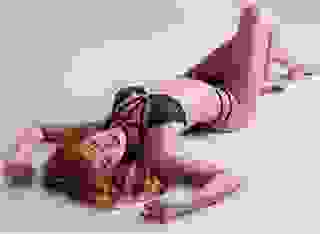Note: You can change font size, font face, and turn on dark mode by clicking the "A" icon tab in the Story Info Box.
You can temporarily switch back to a Classic Literotica® experience during our ongoing public Beta testing. Please consider leaving feedback on issues you experience or suggest improvements.
Click hereJust as she never understood their hatred of her, she never understood their inability to like anyone who wasn't just like them, white, Anglo-Saxon and Protestant. Their way of closed minded living was so unlike Sarah's open and accepting way of life. She loved all people no matter their race, color and creed.
"She wasn't one of them. She'd never be one of them. She wasn't good enough for my son," she remembered the conversation she had with her husband when he confessed the words of his mother to Sarah after being asked why his parents didn't want to meet her.
"Well, they are right that I'm not one of them and never will be one of them, but they are wrong that I'm not good enough for you," she said in an unaccustomed angry tone that suddenly made her want to paint a nice landscape of flowers and trees to calm her mood.
She wasn't one of the blue blooded, fair haired, socially connected, tall and thin, rich debutants that they wanted their son, Jeffrey, to marry. They had hoped that he would have married Carolyn Jorgenson, daughter of George and Jessica Jorgenson, the construction tycoon or Anne Williams, daughter of the billionaire Wall Street financial genius Mark and Samantha Williams or Tara Martin, daughter of Michael and Christine Martin and heir to the great textile fortune. Hoping to use their handsome son as a pawn to connect them higher up the social ladder, they couldn't believe he abandoned their privileged way of life for a Gypsy.
As cold as his parents were rich, as insensitive to the plights of the poor and to the green goodness of the Earth, Jeffrey rejected his parents' lifestyle for Sarah. He found all that he wanted and all that he needed in Sarah. Filled with life, she was full of love not only for him but also for every living thing that lived on the planet at the same time she did. When they had sex, it was real. It wasn't rehearsed. It wasn't expected and preplanned, it was magical and it was natural. Friends first who had become lovers; they committed their love for one another by taking their vows of marriage. It was as if they were one with their bodies and one with the Earth.
She truly loved him and now she truly missed him. The deep sorrow she felt for the loss of her friend, her lover, and her husband was worsened by the mean spirited position that his parents' took in trying to take children away from their mother. Her children were all that she had left of him and she couldn't allow that to happen. Yet, more than that, they were her children. Aside from having plenty of money and connections to win any lawsuit they brought against her, what right did they have in taking her children from her? If they took her children away, it would be as if Jeffrey and their love had never existed. That's when she realized the intention of his parents was to plow their lost love in the ground like so much dirt moved with a bulldozer and bury it beneath the foundation of another family.
Sarah spent all the money inherited from Jeffrey's life insurance, savings, and investments on legal fees fighting court custody battles to rightfully keep her children. His parent's were intent on taking their grandchildren away from their mother. It didn't matter how much money Sarah had or didn't have because his family had more than enough money and the free time to spend to insure that they won. When she showed up in court with her one overwhelmed attorney, his family didn't even take the time to make a court appearance; they just sent their four family retained attorneys Paul Meyer, Gary Peterson, Norman Clark, and John Daley of Meyer, Peterson, Clark, and Daley.
Just before the decision was given, what money she had left, she bought a used minivan, loaded up her possessions worth taking, and drove southwest with the kids. With warrants for her arrest, amber alerts posted, charges filed for parental kidnapping, and private investigators skip tracing her every confirmed and unconfirmed move, she moved around and backtracked until she accidentally found a friendly and peaceful spot, miles from the main road, in Hopedale Valley.
She had a flat tire and flagged down a passing motorist to help her. Fortunately for the man changing the tire while making small talk with the kids, Domenic was locked away in the cat carrier, which was, really a large dog carrier.
"What is that," said the man upon hearing the cat growl and peering in the minivan before jacking up the van. "A cougar?"
"That's Domenic," she said with a laugh. "He's a Maine Coon cat. He's very protective of my children. He doesn't like strangers, especially men."
"A cat? That's a cat? I've never seen a cat that big in my life," he said taking another curious but cautious look before changing the tire.
She moved her kids out of the van and away from passing cars. There, perched upon a plot of tufted grass that grew out of a ledge of rock, she overlooked Hopedale Valley. The vista made her want to paint it. It was beautiful. She couldn't imagine this sight at sunrise or at sunset. It must be spectacular.
She was tired of running and tired of driving. When the stranger asked about her paintings in the van, she told him that she was an artist looking for a place to live and work. He directed her to an apartment in town he knew was vacant. Knocking at their door at suppertime, the homeowners welcomed her with an invitation to dinner and a place to call home.
One big room, it was an oddly difficult to rent space, long and narrow and except for the half dozen support beams, it had a glass ceiling. Not a good space for a family to live, it was a perfect space for her to paint. Accepted with open arms, she disappeared within this small town and lived in a third floor artist's loft that she could barely afford. Always behind with the rent, Mr. Morris, the landlord, accepted more than one of her paintings in lieu of her rent payment. A retired couple without children, he and his wife, Maureen, adopted the kids, as if they were their grandchildren. Whenever Sarah asked them to baby-sit, which they were always happy to oblige, they fattened the kids with food, nurtured them with love and attention, and spoiled them with sweets and toys.
The apartment gave her plenty of light but not much else. Running space heaters and believing in the premise that heat rises and sharing what little heat made it up to them from the two floors below before escaping through the roof, they all shivered and huddled in one, big room. Besides, with her kids bundled up in their jackets and blankets and with Sarah's passion to paint and create keeping her warm, they were seldom cold enough to notice the frigid temperatures outside that frosted their windows and curled their toes. Domenic, with his raccoon like tail and long haired, thick coat, did his best to keep everyone warm.
She made what little money she could selling her paintings of landscapes and still life pictures of flowers and trees on E-Bay and at the fairs they had in surrounding communities. She was no Rembrandt nor did she have pretensions to be, but she was an accomplished artist who may have success, one day. If only she could put more emotion into her work, perhaps, then she'd encourage the interest of a patron of the arts, someone who believed in her talent as an artist and someone who would arrange to show her work at a gallery. Yet, with two hungry kids to feed and clothe while trying to satisfy her passion to paint, it was a juggling act that routinely had her dropping balls and missing opportunities.
The holidays were always good for her. From mid-November through mid-January, people bought most of what she brought with her to sell and occasionally some commissioned her to paint something special and something that always offended her sense of size, shape, color and style, but she did it for the money. Only, it was difficult for her to lug around two kids and her canvases without the help of a man. There weren't many men eager to take on a woman with two kids, especially in the frightfully disheveled state she now looked.
Since the death of Jeffrey, she had let herself go. Not getting enough sleep, burning the candle at both ends caring for her children, painting, and working to sell what she painted, she had deep bags under her eyes. She couldn't remember the last time she had her hair done or had enough money to buy a new piece of clothing. Going without food to make sure that her children had enough to eat, oftentimes she skipped a day or two without taking a shower. Unless she considered the dried paint that collected beneath her fingernails, she didn't have the time, inclination or money to waste on nail polish and on painting her nails.
With her heart still belonging to Jeffrey, it wasn't men who held her interest or sparked her desire. It was her children and her art. Typically attired in t-shirt, jeans, colorfully speckled sneakers with a loose flowing paint spattered smock, it was visually obvious that she cared more about her children and her artwork than she did her appearance.
The minimum amount of furnishings she had in her loft were unwanted items that were discarded at the curb or from dumpster diving. Up three flights of stairs and carrying the load alone, one man's trash somehow found its way to her tree top height sanctuary. Too warm in the summer and too cold in the winter, but besides the light that flowed in the huge wall to ceiling windows of her loft, she loved the view. The views were breathtaking. She had a commanding view of the whole valley from her crow's nest perch and her newly inspired landscapes benefited from her birds eye view.
On a bedroom community street where most homes were one story ranches and two story split levels, her three storied Victorian that was built higher up on a hill gave her the best view of the landscape miles in every direction. Except for the church steeple, a water tower, and the fire tower in the distance, there was nothing blocking her view. Apparently, the original builder of the house was an artist and because this house was one of the first homes built in the neighborhood, the three story structure was grandfathered in the zoning laws of the town. It could only be rebuilt should it burn down. Enforced to dissuade developers from buying up cheap land to spoil their landscape with three and four story townhouses that would disrupt their quiet community with people and cars, no other homeowner could build a house more than two stories.
Of course with the long arm of the law and the money that the Laughton's had at their disposal to spend to find and claim their grandchildren, it was only a matter of time before Sarah and her children were found. It was a day like any other when the private investigators parked their car down from where Sarah lived. Photographing her waving good-bye to her kids from the front porch of the Morris's, they followed her to the flea market where she sold her paintings. Once, there, they summoned the police to arrest her for violating her court order and for kidnapping. Carted off to jail, they then showed them a copy of the court order and directed the police to take custody of the children. Last on the agenda was to photograph Sarah's apartment to prove that she was inadequately caring for the children, should they need more evidence in court to remove the children from her custody and place them with the grandparents.
Tom and Ed of Secured Investigations climbed the stairs that led to Sarah's apartment. The crying of the children could be heard in the distance as the police quickly loaded the kids in the squad car. Domenic was upset that his babies were crying.
"Meow," purred Domenic from behind the closed front door. "Meow, meow."
For such a massive cat, no one would know how big this monster was by his polite, petite meow and cute purr. Tom and Ed didn't need a key to open Sarah's front door. The door wasn't even locked. This was Hopedale Valley after all. No one locked their doors here. Everyone knew everyone and there was no crime. There was no need to steal anything when your neighbors would gladly give you whatever you needed, whenever you needed it.
"She's got a kitty," said Tom before opening the door. "I love kitties. What should we do with it?"
"The landlord will take care of it," said Ed. "Leave it for them. That's their problem," he said with a wave of his uncaring hand.
"Remind me to put some milk down before we go," said Tom.
"Remind yourself. I hate cats," said Ed.
The men entered the loft and snapped on the light. Tom looked around for the kitty while Ed snapped off photos.
"Here kitty, kitty, kitty. Here kitty, kitty, kitty," said Tom. "I don't see the cat anywhere."
"That's because he's over here," said Ed. "What the Hell kind of cat is this?"
Domenic launched himself at Ed's face. With fur flying, claws scratching, and cat biting, Ed did everything he could to remove the cat from his face, but Domenic was too big and too strong. It was an accident he said later to animal cruelty charges filed against him by the Morris's when he flung Domenic out the open window. Living out in the wild for so long, the cat must have already expended its nine lives because this time, free falling from three stories, the cat looked so much like road kill on the street down below.
Only, when the men emerged from Sarah's apartment, Domenic was there waiting in ambush for them and now he was really mad. Again, he launched himself at Ed knocking the expensive digital camera from his hand and crashing and smashing it to the ground. It took all the strength that Ed had left to run to his car. Only, Domenic was right behind him and launched his fat body after his prey. For a cat so large, he could move and he beat Ed to the car and taking a bite out of his fat ass.
Out one door and in the other, finally Ed was safe from the cat. Only, the cat had done its damage. His face and neck were a bloody messed. He looked as bad as Roy Horn did from Siegfried and Roy fame when Montecore, Roy's white, pet tiger nearly mauled him to death.
Domenic's victory was short lived. He succumbed from the injuries suffered from his three story fall. As if having returned to protect his master, Sarah found him lying across the welcome mat at her front door when she finally arrived home. Not knowing that all the blood on the cat was from Ed, the private investigator, she thought he had been hit by a car, until the Morris's told her that Domenic had attacked the men. With tears in their eyes, her neighbors told her how the ever so protective and fearless Domenic defended himself to his death.
Once arrested, Sarah was transported back to New York and imprisoned over the weekend before the judge released her on bail that Monday with a restraining order not to see or contact her children or her in-laws. With no where else to go, she returned home to Hopedale Valley and to her life as an artist. Only, this time, still mourning the loss of her beloved husband and without her children and without her beloved cat, her life was different.
Her paintings were different, too. They were no longer nice. They were angry. She painted angry trees and angry flowers with angry landscapes. She painted Domenic in the field where she first met him. She painted him strong and fearless. She painted him wildly bigger. She painted him as a ghost cat that necessitated that you look long and hard at her canvases before discerning the eyes of the cat and then the body. Finally, she painted him perched on the biggest branch of her beloved oak tree looking so much like the fat Cheshire cat in Alice and Wonderland, but so much bigger and so much meaner. She was sad. She was heartbroken. Still mourning the loss of her husband and now the loss of her children, as well as the loss her loyal, beloved cat, she was angry.
Never having painted people before in her paintings of trees and flowers, she painted her children, as she remembered them blonde, beautiful, and happy. She painted them in the field of dying flowers standing by the oak tree. Now, all of her landscape paintings were not only of flowers and trees but were of flowers, trees, children, and ghost cats. Suddenly, her artwork came alive with the activity and the deep imbedded meaning, albeit more than a bit turbulent with torment from an angry artist, ala Jackson Pollock.
Every scene was as windy as it was stormy. Every scene was an inside look of the artist's soul and how she felt when painting it. Every canvas captured her raw emotions of rage. There within the beauty of Hopedale Valley landscapes were the inexplicable and inescapable scenes of real life filled with death, tragedy, hurt, and hate. So counter to the beautiful landscapes that she painted, the depth of emotion gave her artwork a deeper dimension.
Although they were disturbing images of an impending storm, there was so much motion of emotion there that it was difficult for the viewer to take their eyes away. No longer did they only see pretty flowers and trees when they looked at her landscapes. Within the beauty of nature, they saw all the fury that was the Earth. Needing to look again and again, there was always a new element that they hadn't seen before. Then, as her passion for art calmed her and her need to express herself through her painting overtook her, she began painting what she was meant to paint, nice paintings.
As months turned to seasons and the seasons turned to years, with kidnapping charges dropped and her old life behind her, she no longer painted her beloved tree in Vermont but only painted Hopedale Valley. Scenes of Hopedale filled her entire loft. Only, as quickly as she painted them, she sold them. Each painting sold for more, until her large paintings were fetching five figure fees. People of wealth, power, and influence commissioned her to paint for them. With every picture she painted, she told her customer her sad story. With every painting she sold, she made more new friends.
It was the photos that the private investigators took of Hopedale that encouraged the interest of her in-laws. Only, their interest didn't pique until Sarah made the town famous with her paintings and it wasn't until her in-laws saw some of her paintings of Hopedale that they realized their dream. There was money to be made in Hopedale Valley, lots of it.
Suddenly, there were tourists in a town that wasn't even on the map. Now, there was talk of building a new bridge for better access to the highway and posting more signs to direct people to the town. The diner and café never did so much business and had to hire two more full time people. The country store bought the larger vacant building across the way and the school approved a new budget for the people with children they expected were coming to buy homes.
Only, behind the scenes, the Laughton's in their speculative real estate business had already bought up much of the land that surrounded the area. It took them five years to do it and that was five long years that Sarah did not see or have any contact with her children. It was five years of Sarah moving from painting her angry paintings of trees, flowers, children, and ghost cats to painting pretty landscapes of Hopedale Valley that possessed her soul of emotion.
The Laughton's had big plans, plans so big that they invested much of their fortune and borrowed more to buy the land, pay the permits, hire the surveyors, pay the architects, plan with the designers, and ready the heavy construction machinery to break new ground. Not ones to put all their eggs in one basket, this time they did because, this time, they knew they'd make a killing. This was their last venture capitalist deal. This was the one that would allow them to retire with enough money to pass on to the future generations of Laughtons. Yet, the people of the small community didn't like that an outsider was destroying their utopian community with cars, people, and industry. They enjoyed the business of the tourists but they didn't want them to stay. Once they were done visiting and depositing their cash in their small town, they wanted them to leave.








